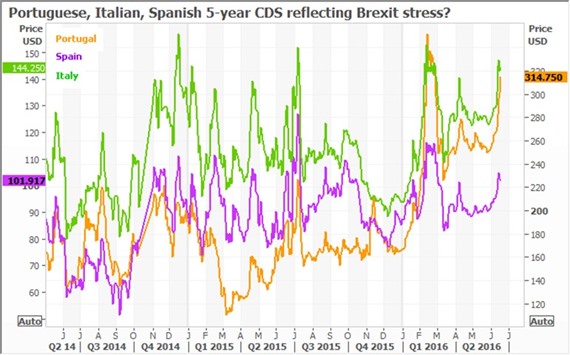Tension emanating from Britain’s Brexit debate has reopened a fault line between the haves and have-nots in the eurozone bond market in an echo of the debt crisis that threatened to tear the bloc apart.
Southern European bond yields soared yesterday with the premium Spain pays to borrow over Germany at its widest in nearly a year, while the cost of insuring against a default in Portugal shot up to a four-month high.
ECB president Mario Draghi drew a line under the debt crisis in 2012 by pledging to do “whatever it takes” to save the euro.
But fears about the future of the eurozone have crept back as Britain readies for a referendum on European Union membership that threatens to choke the bloc’s fragile growth and embolden breakaway movements elsewhere.
As more polls yesterday put Britain’s ‘Leave’ camp ahead before the June 23 vote, investors worried about Brexit dumped riskier peripheral bonds and piled into safe-haven debt.
Top-rated German bond yields hit record lows with maturities out to 10 years below zero, meaning investors are willing to pay Germany for holding its debt.
Safe-haven bonds in Japan and Switzerland saw yields out to 15 and 20 years, respectively, fall below zero.
“Markets are waking up to the fact that Brexit risks are real,” said Richard McGuire, head of rates strategy at Rabobank.
The UK is the world’s fifth biggest economy and a vote to leave could reverberate across the eurozone and leave highly-indebted southern Europe vulnerable to the political fallout.
Polls in Italy show the anti-establishment 5-Star Movement, which wants a referendum on euro membership, is the country’s most popular party.
Italy’s finance minister warned last month that if Britain left the EU, other countries could use it as “an example to follow.”
Spain faces the most imminent political strain, heading back to the polls days after the British vote in a re-run of December’s inconclusive parliamentary election.
Investors also worry that Portugal’s fragile left-leaning government is not focused on getting its debt burden back under control.
The premium Spain would pay to borrow over benchmark Germany hit 163 basis points, a level not seen since July 2015, while the premiums for Italy and Portugal reached their highest in four months.
Credit default swaps, a gauge of credit risk, on Portuguese government bonds are at their highest level in almost four months.
Italian credit default swaps hit four-month highs earlier this week.
Commerzbank said Portugal is still on the brink of crisis with a faltering economy that threatens to delay progress in reducing high levels of public debt.
It said that over the medium term, Portugal remained at risk of losing its last investment grade credit rating, which would exclude it from the ECB’s €1.74tn ($1.95tn) bond-buying scheme.
As peripheral bond markets come under pressure, volatility is also growing, with realised 10-day volatility on Spanish and Italian bonds at their highest since late April.
That bodes ill for peripheral bonds, which benefit from a borrow-at-low-rates, invest-high “carry” trading strategy.
The big danger for these countries is if this volatility prompts domestic banks – some of their most loyal supporters – to re-assess their own carry strategies.
This has in the past caused bond market sell-offs to snowball.
“We would expect a Brexit vote to increase the risk of a run on southern European sovereign markets,” said Peter Schaffrik, chief European macro strategist at RBC.

..
